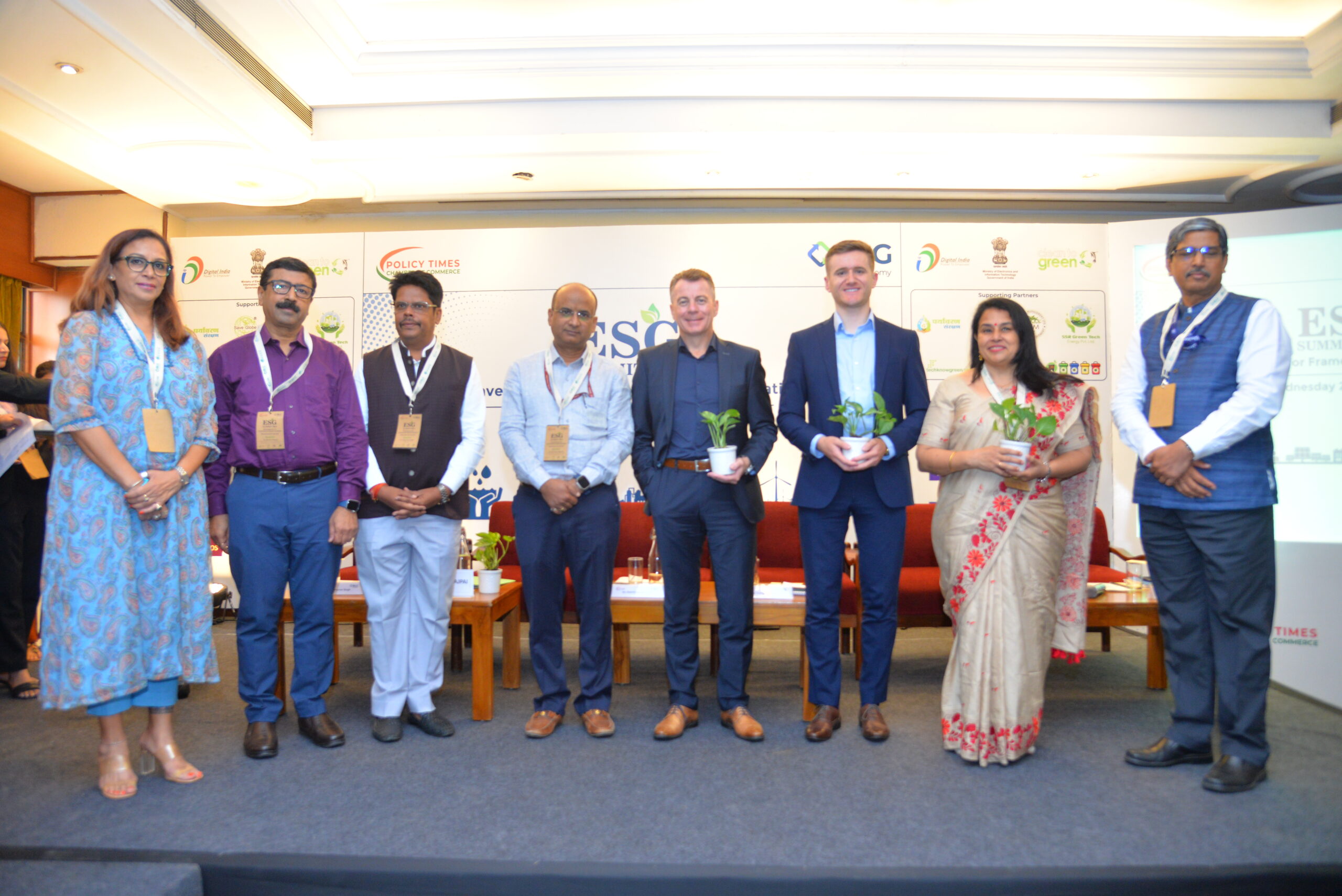The ESG Summit 2024, organized by RLG Systems India Pvt. Ltd. in collaboration with the Policy Times Chamber of Commerce, was initiated on July 25 at Silver Oak Hall, India Habitat Centre, New Delhi. The event aimed to address the convergence and implementation of ESG (Environmental, Social, and Governance) frameworks, and witnessed a gathering over 150 distinguished participants including policymakers, sustainability officers, CSR heads, recyclers, supply chain heads, technology leaders, finance leaders, academicians, and researchers. Industry experts engaged in discussions on critical ESG issues and trends, including ESG frameworks, BRS reporting, risk management, business growth through ESG, and environmental impact assessment.
Mr. Sujit Kumar Bajpayee, Joint Secretary, Ministry of Environment, Forest and Climate Change, inaugurated the summit, and emphasized the importance of ESG convergence in driving sustainable development.
Dr. Sandip Chatterjee, Former Senior Director at the Ministry of Electronics & IT, Government of India, Mr. Patrick Wiedemann, CEO of the Comply Division at Reconomy Group, and Mr. George Atkinson, Head of Policy, Valpak, shared global learnings and stressed the significance of ESG convergence.
Conceptualized in the backdrop of ‘Panchamrit Goals’ for sustainable living, the summit is the fourth event in the distinguished sustainability series organized by the Policy Times Chamber of Commerce and RLG Systems India Ltd. for 2024. While the ‘Panchamrit Goals’ and SEBI’s BRS Reporting for the top 1000 listed companies from May 2021 had set the stage for further deliberations, the summit aims to facilitate dialogue and exchange of insights on the scope of convergence among various stakeholders with respect to framework implementation. Discussions highlighted that circularity alone could save $624 billion in the coming decades, while ESG investments present a $40 trillion global growth opportunity.
In her Guest of Honour address, Smt Roop Rashi, Textile Commissioner, Ministry of Textiles, Government of India said that India has a whopping textile industry to the tune of 165 billion dollars which is expected to reach 300 billion dollars by 2030. Lauding India’s performance in sustainable practices in textile, she told the audience that India only produces world’s 8.5% textile waste while hosting 17% of world’s population, which is the marked manifestation of India’s responsible industrial practices. She also suggested that a responsible textile production should be preferred over the concept of stopping the consumption.
Mr. Patrick Wiedemann, CEO-Comply Division, Reconomy Group, said on the occasion, “Today, environmental, social, and governance considerations are more than just compliance requirements, these are strategic imperatives for business success. The ESG Summit 2024 has set a strong foundation for valuable dialogue and action in the realm of sustainability. I am confident that events like the ESG Summit 2024 and the collective effort of industry leaders, policymakers, and other stakeholders would pave the way to a sustainable future”. He further said, “We at Reconomy and RLG have been driving with dramatic efficiency to the point of a linear economy professionalizing supply chains on a global scale over the past hundred years and now we are going to reinvent that concept into a circular setup”.
Ms. Radhika Kalia, MD, RLG Systems India, conveyed hope for a sustainable future, saying “I feel immense pride in being part of the efforts aimed at driving sustainable transformation through the ESG Summit 2024. The event underscores our commitment to incorporating Environmental, Social, and Governance principles into the core of our operations and beyond. The esteemed gathering of industry leaders, policymakers, and sustainability advocates here today instils strong hope within me that as a community we are indeed taking steps to foster an environment that encourages robust dialogue, valuable insights, and strong action. Such collaborative efforts would redefine our supply chains, leverage circular economy principles, and unlock the potential of ESG investments. I am confident that through consistent action and sincere intent, we would realize our goal of creating a sustainable and resilient future for India and the world.“
Mr. George Atkinson, Head of Policy, Valpak, said, “The ESG Summit 2024 is a reminder of our responsibility to translate our sustainability commitments into tangible actions. While we see significant opportunity in ESG investments, it is imperative that we harness this potential to create a cleaner, more sustainable future for the generations to come. The discussions on the convergence of ESG frameworks have shed important light on the importance of aligning our economic aspirations with environmental stewardship, and of ensuring that our progress is sustainable and inclusive. Having said that, the core efforts that must be ensured in many nations for the successful implementation of EPR include consistency of policy and communication with consumers. Robust enforcement is absolutely crucial“.
About RLG Systems India Pvt. Ltd.
RLG Systems India, a subsidiary of Munich-based RLG GmBH and part of Reconomy’s Comply vertical, is a premier waste management service provider in India. Since our inception in 2017, we have specialized in environmental compliance services, offering robust Extended Producer Responsibility (EPR) fulfilment and takeback schemes for E-waste, plastic packaging, battery waste, and Tyre waste. Our mission is to help producers, importers, brand owners, and manufacturers comply with the Waste Management Rules and adhere to the guidelines set by the Ministry of Environment, Forest and Climate Change (MoEF&CC) and the Central Pollution Control Board (CPCB). We have established a reverse value chain that benefits all stakeholders, aligning with the government’s goal for a cleaner environment. Our extensive network includes over 40 waste recyclers and more than 100 dedicated employees. Over the past six years, we have successfully collected, channelized, and recycled over 200,000 metric tons of waste.

